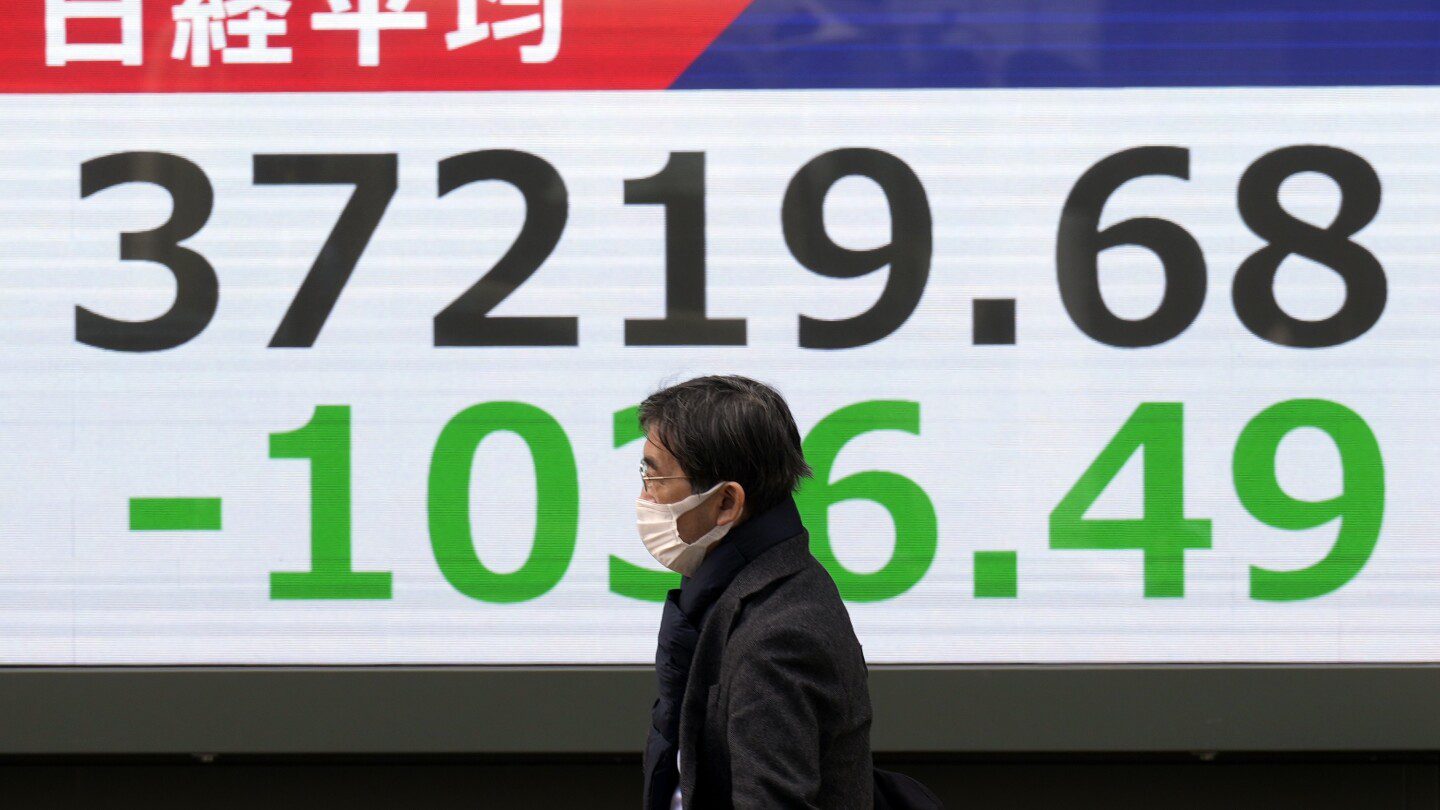
BANGKOK (AP) — Stock markets in both Europe and Asia witnessed declines on Friday, with major indices in Japan, Hong Kong, and South Korea experiencing drops exceeding 2%. This downturn follows U.S. President Donald Trump’s announcement about enforcing a 25% tariff on imports from Canada and Mexico, alongside a hike in tariffs on Chinese goods to 20%, which has left investors unsettled.
In Germany, the DAX index saw a decline of 0.4%, closing at 22,458.23, while France’s CAC 40 also fell by 0.4% to 8,073.90. Meanwhile, the UK’s FTSE 100 dipped slightly by 0.1%, ending at 8,751.32.
Conversely, U.S. futures showed a slight uptick, with S&P 500 and Dow Jones Industrial Average contracts rising by 0.3%.
In Asia, Japan’s Nikkei 225 index plummeted 2.9% to 37,155.50, largely driven by significant losses in the technology sector. Notable declines included Advantest, which dropped by 8.8%, Disco Corp. with a 10.3% loss, and Tokyo Electron retreating by 4.5%.
Hong Kong’s Hang Seng index fell by 3.3%, closing at 22,941.32, while the Shanghai Composite index decreased by 2%, settling at 3,320.90.
Trump stated on Thursday that “the TARIFFS set to take effect on MARCH FOURTH will proceed as planned” for imports from Canada and Mexico.
In response, China’s Commerce Ministry issued a statement on Friday, criticizing Trump’s decision to impose an additional 10% tariff on Chinese imports. The ministry claimed this action violates international trade regulations and could place additional strain on American companies and consumers, ultimately disrupting the global supply chain.
South Korea’s Kospi index fell by 3.4%, closing at 2,532.78, while Australia’s S&P/ASX 200 index decreased by 1.2% to 8,172.40. In the previous session, the S&P 500 dropped by 1.6%, the Dow fell by 0.4%, and the Nasdaq composite lost 2.8%.
The S&P 500 has decreased in five of the last six trading sessions after reaching an all-time high last week. Much of this decline has been fueled by concerns regarding the U.S. economic landscape, particularly fears that the new tariffs could exacerbate inflation and lead to increased unemployment due to government layoffs.
Meanwhile, Nvidia, a formidable player on Wall Street, experienced an 8.5% decline after initially soaring following a better-than-expected earnings report. Despite consistently delivering strong earnings, this downturn comes in the wake of competition from China’s DeepSeek, which claims to have developed a large language model capable of rivaling top alternatives without utilizing costly chips.
The ongoing tariff discussions are contributing to rising anxiety among U.S. households regarding the economy. This sentiment is concerning, as consumer spending has played a crucial role in preventing a recession.
The uncertainty also places additional pressure on the Federal Reserve, which faces limited options to address a slowing economy paired with rising inflation.
At present, the U.S. economy continues to exhibit resilience. The government recently maintained its assessment of the economy’s performance in the final quarter of 2024, although it did revise upward its inflation estimates for that period.
Additionally, a separate report revealed that the number of U.S. workers seeking unemployment benefits increased last week, reaching a three-month high. However, this figure remains significantly lower than during previous recessionary periods.
In early Friday trading, the price of U.S. benchmark crude oil fell by 70 cents to $69.65 per barrel on the New York Mercantile Exchange. Brent crude, the international standard, decreased by 66 cents to $72.91 per barrel.
The U.S. dollar strengthened to 150.44 Japanese yen from 149.82 yen late Thursday, while the euro rose slightly to $1.0402, up from $1.0401.









